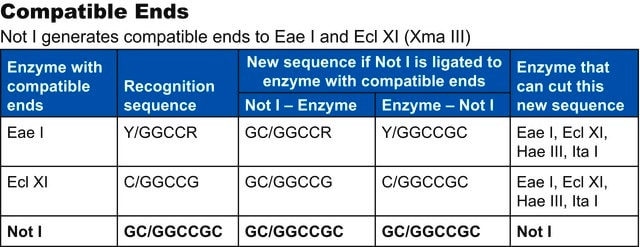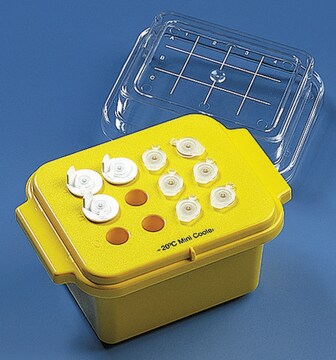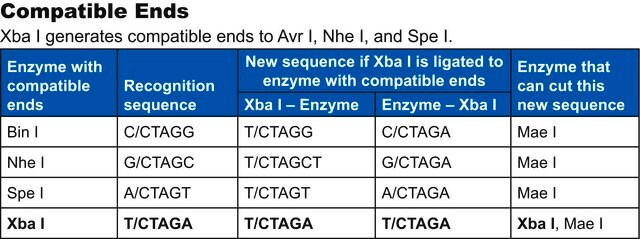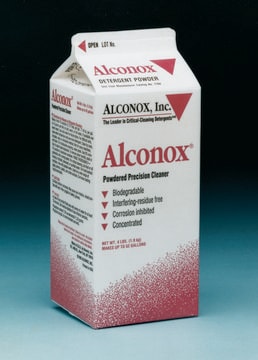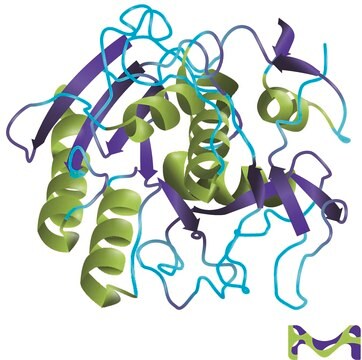BLNI-RO
Roche
Bln I (Avr II)
from Brevibacterium linens
About This Item
Prodotti consigliati
Origine biologica
bacterial (Brevibacterium linens)
Livello qualitativo
Forma fisica
solution
Attività specifica
10000 U/mL
Confezionamento
pkg of 1,000 U (11558170001 [10 U/μl])
pkg of 200 U (11558161001 [10 U/μl])
Produttore/marchio commerciale
Roche
Parametri
37 °C optimum reaction temp.
Colore
colorless
pH
8.1 (39 °F)
Solubilità
water: miscible
Compatibilità
suitable for molecular biology
applicazioni
life science and biopharma
sample preparation
Attività estranea
Endonucleases, none detected (up to 20 U with MWM II-DNA)
Endonucleases, none detected (up to 20U with pBR 322-DNA)
Condizioni di spedizione
dry ice
Temperatura di conservazione
−20°C
Descrizione generale
Compatible ends
Bln I ends are compatible with ends generated by Nhe I, Spe I and Xba I.
Isoschizomers
Bln I is an isoschizomer of Avr II.
Note: The complete 13 site Avr II restriction map of the E.coli genome has been reported.
Methylation sensitivity
The enzyme is not known to be affected by methylation.
Specificità
CCTAGG
Restriction site: C↓CTAGG
C↓CTAGG
Heat inactivation: No inactivation of Bln I after incubation at 65 °C for 15 minutes.
Qualità
1 μg λDNA is incubated for 16 hours in 50 μl SuRE/Cut Buffer H with an excess of Bln I. The number of enzyme units which do not change the enzyme-specific pattern is stated in the certificate of analysis.
Absence of exonuclease activity
Approximately 5 μg [3H] labeled calf thymus DNA are incubated with 3 μl Bln I for 4 hours at +37°C in a total volume of 100 μl 50 mM Tris-HCl, 10 mM MgCl2, 1 mM Dithioerythritol, pH approximately 7.5. Under these conditions, no release of radioactivity is detectable, as stated in the certificate of analysis.
Typical ligation and recutting assay
Bln I fragments obtained by complete digestion of 1 μg λ × EcoR I DNA ligated for 16 hours at +4°C with 1 U T4 DNA Ligase in 10 μl buffer that contains 66 mM Tris-HCl, 5 mM MgCl2, 5 mM Dithiothreitol, 1 mM ATP, pH 7.5 (at +20°C). The percentages of product that can be ligated and subsequently recut with Bln I and EcoR I (yielding the typical pattern of λ × EcoR I × Bln I fragments) are stated under "Lig" and "Rec" in the certificate of analysis.
Profilo DNA
- λ: 2
- φX174: 0
- Ad2: 2
- M13mp7: 0
- M13mp18:0
- pBR322: 0
- pBR328: 0
- pUC18: 0
- SV40: 2
Definizione di unità
Stoccaggio e stabilità
Risultati analitici
Bln I has been tested in Pulsed-Field Gel Electrophoresis (on bacterial chromosomes). For cleavage of genomic DNA (E.coli C 600) embedded in agarose for PFGE analysis, we recommend using 10 U of enzyme/μg DNA and 4 hour incubation.
The buffer in bold is recommended for optimal activity
- A: 25-50%
- B: 50-75%
- H: 100%
- L: 0-10%
- M: 25-50%
Altre note
Solo come componenti del kit
- Enzyme Solution
- SuRE/Cut Buffer H 10x concentrated
Codice della classe di stoccaggio
12 - Non Combustible Liquids
Classe di pericolosità dell'acqua (WGK)
WGK 1
Punto d’infiammabilità (°F)
does not flash
Punto d’infiammabilità (°C)
does not flash
Certificati d'analisi (COA)
Cerca il Certificati d'analisi (COA) digitando il numero di lotto/batch corrispondente. I numeri di lotto o di batch sono stampati sull'etichetta dei prodotti dopo la parola ‘Lotto’ o ‘Batch’.
Possiedi già questo prodotto?
I documenti relativi ai prodotti acquistati recentemente sono disponibili nell’Archivio dei documenti.
I clienti hanno visto anche
Articoli
The term “Restriction enzyme” originated from the studies of Enterobacteria phage λ (lambda phage) in the laboratories of Werner Arber and Matthew Meselson.
Il team dei nostri ricercatori vanta grande esperienza in tutte le aree della ricerca quali Life Science, scienza dei materiali, sintesi chimica, cromatografia, discipline analitiche, ecc..
Contatta l'Assistenza Tecnica.

